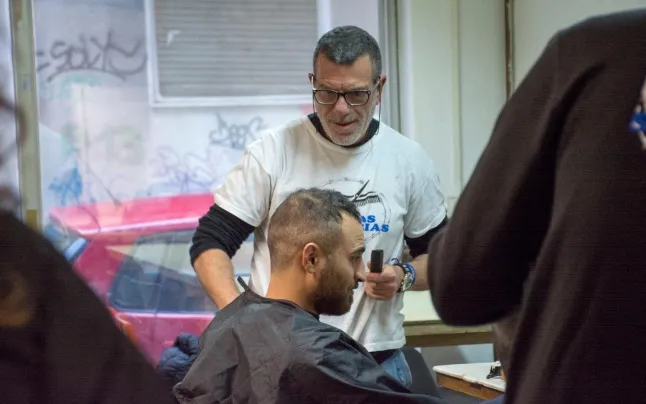Tijeras Solidarias, run by Saúl Sancho from Badalona, is an NGO that started off in refugee camps in Greece, offering haircuts, treatments and combing to refugees in the camps.
What took you to Greece?
It all started when a customer for more than 30 years, Òscar Camps (the founder and director of NGO Proactiva Open Arms) came to my saloon for a haircut and told me what he had seen at a refugee camp in Lesvos: mothers were massively shaving their children’s hair to stop them from getting lice. That is when I decided I wanted to go there, so I contacted a person who had already visited a refugee camp.
We got hold of an old car and a clapped-out caravan, filled them with equipment and drove for days. When we arrived, we found the camp had been militarised and we weren’t allowed in.
So what did you do?
There was nothing we could do there. By the third day, when we were walking along the Piraeus port we spotted an esplanade with tents. When we moved closer, we discovered there were some 1,200 people living there.
There were volunteers from many countries, and we told them we also wanted to help whichever way we could. So I got a chair, the equipment we’d brought and started offering haircuts.
How did people react?
In refugee camps you’ll find people who, before conflicts and wars, lived a life like ours: they had homes, businesses and, of course, they could go to a hair saloon or barber’s.
Basic needs are important, but so are personal hygiene and image. In fact, they could also be considered a basic need. Based on how a person sees him or herself, and how others see them, their mood will be different…so we were really welcome.
How often did you return?
Before the pandemic, we went there 12 or 14 times. When I started to explain what I did on social media, many colleagues from around Spain got in touch to come with me on my trips.
Each person came with their experience and equipment, with no other help. As soon as the media started to spread the news, things changed. All of a sudden we started receiving phone calls from companies offering to donate equipment or pay for shipment.
How has the pandemic affected your project?
We’ve stopped going to Greece. The contacts we had there have left, and those who stayed, tell us the situation is quite dire. So, thanks to an idea of a colleague from Extremadura, we decided to work locally, in a similar way.
So, now we go to places where we know there are people with no resources, such as soup kitchens, to reach out to as many people as possible and offer to comb or cut their hair. Sometimes we’ve also worked out in the street.
Do you intend to continue this task?
If only there wasn’t a need for this NGO. Alas, it still is necessary and we will continue to work as long as we can. What we receive is much greater than money can pay and, as my friend Rafael Pagès once said, what we do is to touch people’ souls.







Add new comment